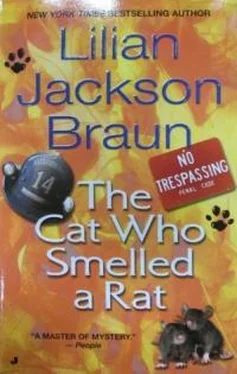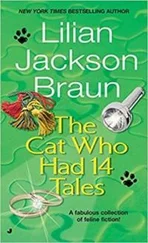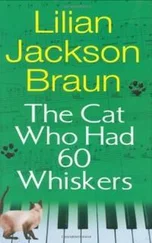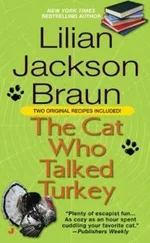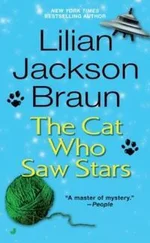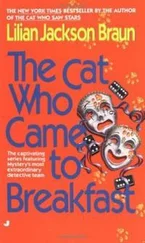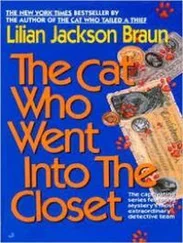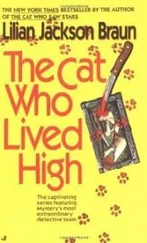“Worshiped his father, a door-to-door book salesman.”
“His mother died early, and he was raised by his grandmother. Her husband was a blacksmith, and he built the feldspar building for them to live in. The smithy was in the backyard.”
“Under a spreading chestnut tree?” Qwilleran asked.
“It happened to be a mighty oak,” Homer said. “It was cut down when Edd asphalted the yard as a parking lot. He rented a few spaces for parking.”
“You mentioned on the phone that you had some information-“
“Something his grandmother told him on her deathbed,” Rhoda said. “We thought it might be a story for your collection of Moose County legends.”
“I won’t know till I hear it. Do you remember the details?”
“Between the two of us, I think we can remember how it went, but you’ll have to write it in your own narrative style, Qwill.”
He turned on his tape recorder.
On the way back to town he began dry-writing the story in his head. First he dropped off the photo of Gov. Witherspoon at the library.
“Sorry to be unsuccessful,” he apologized to the volunteers. “But here’s what I suggest: Feature it as a mystery photo. Invite the townfolk to bring their family albums to the library and see if they can match up any of the faces. I’ll mention it in my column.”
His idea was received with delight. Polly was back from the dentist, but he had no time to go up to her office. He wanted to go home and write Secrets of the Blacksmith’s Wife, as told to Eddington Smith by his grandmother.
When Pickax was named the county seat-because of its central location-it was only a hamlet, but a building boom started almost overnight. The blacksmith, who made nails as well as horseshoes, could hardly keep up with the demand as ambitious settlers built dwellings and shops. Then one day he was kicked in the head by a horse and died on the spot. There was panic in Pickax! No blacksmith! No nails!
The next day, by a strange coincidence, a stranger walked into town-a big brawny man carrying a stick over his shoulder with a bundle tied on the end. He wore his hair longer than was the custom in Moose County, and at first he was viewed with suspicion. When he said he was a blacksmith, however, the townfolk changed their attitude.
Could he make nails?
Yes, he could make nails.
What was his name?
John.
John what?
He said, “Just John. That’s all the name you need to make nails.”
This was somewhat irregular, but they needed nails, so the local officials put their heads together and listed him on the town rolls as John B. Smith, the middle initial standing for “Black.”
When Longfellow wrote “The smith a mighty man is he,” he might have been writing about John B. He was tall and broad-shouldered, with large and sinewy hands, and his muscles were strong as iron bands. No one dared criticize his long hair. Furthermore, he was twenty-two and good-looking, and all the young women in town were after him. It was not long before he married Emma, who could read and write. They had six children, although only three reached adulthood-not an unusual situation in those days. He built them a house of quarry stone with a front of feldspar that sparkled like diamonds on a sunny day. It was much admired by the other settlers, who liked novelty.
The smithy was in the backyard, and there John worked industriously, turning out tools, wagon wheels, cookpots, horseshoes, and nails. He was a good provider and went to chapel with his family twice a week. Emma was the envy of most women in town.
Once in a while he told her he had to visit his old mother in Lockmaster, and he would get on his horse and ride south, staying a week or more. The local gossips said he had another wife down there, but Emma trusted him, and he always brought her a pretty shawl or a nice piece of cloth to make into a dress.
Then came a time when he failed to return. There was no way of tracing his whereabouts, but Emma was sure he had been killed by highwaymen who wanted to steal his horse and gold watch. Lockmaster-with its fur-trading and gold-mining-offered rich pickings for robbers. Someone from the next town wanted to buy John’s anvil and tools, but Emma refused to sell.
Yet, as time went on and she thought about his past behavior, she remembered how he used to go out into the yard in the middle of the night without a lantern. She never asked questions, and he never explained, but she could hear the sound of digging. That was not so unusual; there were no banks, and valuables were often buried. Then she recalled that it always happened after a visit to his old mother.
Emma was fired by curiosity, and she went out to the smithy with a shovel. It was dark, but she went without a lantern rather than arouse further gossip. Most of the yard was trampled hard as a rock. There was one spot near the big tree where she tried digging. There were tree roots. She found another spot.
Then, just as she was about to give up, her shovel struck metal. She dropped to her knees and began scraping the soil furiously with her bare hands, gradually exposing an iron chest. With her hands trembling and heart pounding, she opened the lid. The chest was filled with gold coins! Frightened by the sight, she closed the lid and knelt there, hugging her arms in thought-deep thought… . There had been a dark rag on top of the gold. Once more she opened the lid-just a few inches-and reached in stealthily as if afraid to touch the coins. Pulling out the rag, she took it indoors to examine by lamplight.
It was bright red. It was the red bandanna that a pirate tied around his head.
She went back to the yard, covered the chest with soil, stamping it down with her feet. The next day she had the yard paved with cobblestones.
Emma had always wondered where her husband had acquired his gold watch.
And Qwilleran wondered, as he wrote the last sentence, how freely had Eddington chatted with the strangers who spent hours on his ladders? Had he told them his grandmother’s tale?
The Siamese seemed to be spending many of their waking hours on the coffee table, mesmerized by the French martini pitcher. While Yum Yum hung back warily, Koko gave it a nearsighted, nose-twitching examination. No doubt he thought he saw movement inside. The thick glass, its voluptuous shape, the ever-changing quality and direction of the light source, and his own shifting position-all produced an effect of activity inside the innocent jug.
Koko was hanging over it as if it were a crystal ball, and Qwilleran wondered whimsically if the cat could read the future. He had to guard against taking the cat’s prescience too seriously, so he said heartily, “Any excitement today? Did any river rats come up for a drink of water? I hope you didn’t invite them in.”
Koko and Yum Yum acted totally deaf.
As always, on acquiring another legend for his collection, Qwilleran was exhilarated-until he thought, How can I publish this? It’ll bring a horde of opportunists with jackhammers!
Membership in the Honorable Society of Treasure Hunters had been growing since a few had struck it rich. Old-timers in Moose County would rather bury their money in a coffee can in the backyard than entrust it to a bank. The sites of former outhouses were said to be particular treasure troves. The diggers went out after dark. It was a wholesome hobby, they said, affording fresh air, exercise, excitement, and sometimes rewards. Their enthusiasm was not shared, however, by property owners whose lawns, pastures, and fields of soy beans had been excavated.
Then Qwilleran thought, The Bixby realty agent (if that’s what he was) may have had something in mind other than a strip mall. “Yow!” came a loud clear comment from Koko-either to corroborate Qwilleran’s theory or remind him that dinner was overdue.
Читать дальше
